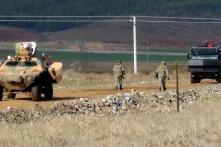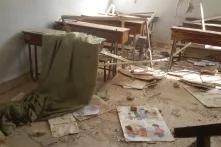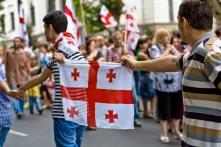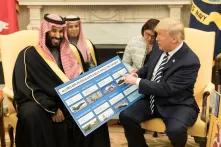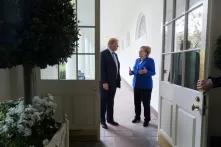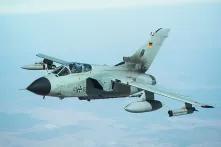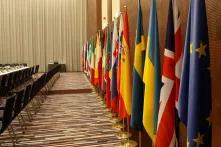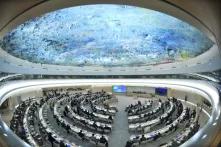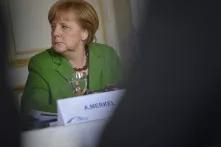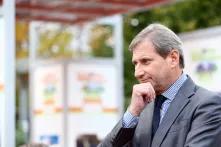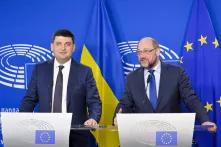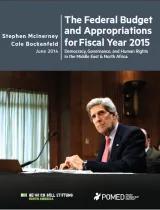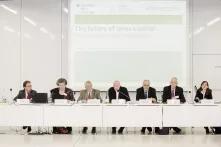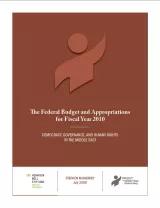All Foreign & Security Policy Content
The evolution of the EU’s naval operations in the Central Mediterranean: A gradual shift away from search and rescue
Capstone
Main image in widescreen?
uploaded image ratio
Flashpoints in U.S.-Turkey Relations in 2021
Study
Main image in widescreen?
uploaded image ratio
Reinventing Transatlantic Relations on Climate, Democracy, and Technology
Main image in widescreen?
uploaded image ratio
While conflict with the EU is likely to continue, Poland’s government banks on close relations with the White House
Analysis
Main image in widescreen?
uploaded image ratio
War in Syria: The horror of Idlib
Comment
Main image in widescreen?
uploaded image ratio
1325AndBeyond - An International Essay Competition
Main image in widescreen?
uploaded image ratio
Third Anniversary of EU-Turkey Statement: A Legal Analysis
Main image in widescreen?
uploaded image ratio
Trudeau’s Foreign Policy: Progressive Rhetoric, Conventional Policies
Analysis
Main image in widescreen?
uploaded image ratio
Rashida Tlaib and Ilhan Omar Barred From Israel—But a Conflagration Is Coming
Transatlantic Media Fellowship
Main image in widescreen?
uploaded image ratio
From Sarajevo To Christchurch
Transatlantic Media Fellowship
Main image in widescreen?
uploaded image ratio
Once Again, Ukraine Steps Into the Unknown
Transatlantic Media Fellowship
Main image in widescreen?
uploaded image ratio
In Ukraine’s parliamentary elections, President Zelenskiy’s party is likely to dominate
Article
Main image in widescreen?
uploaded image ratio
Trump Meets Putin at G-20 While Ukrainian Sailors Remain Jailed
Transatlantic Media Fellowship
Main image in widescreen?
uploaded image ratio
In Georgia’s Parliament, One Russian Too Many
Transatlantic Media Fellowship
Main image in widescreen?
uploaded image ratio
Focused on the Far Right
Main image in widescreen?
uploaded image ratio
European election campaign in Poland: test run for autumn general elections
Backgrounder
Main image in widescreen?
uploaded image ratio
2019 Cohort of Transatlantic Media Fellows
Announcement
Main image in widescreen?
uploaded image ratio
Not Getting Away With Murder
Commentary
Main image in widescreen?
uploaded image ratio
A Merkel-Trump Clash at NATO Seems Inevitable - What Will Germany Do?
Commentary
Main image in widescreen?
uploaded image ratio
Finland's Reluctance to Join NATO
Transatlantic Media Fellowship
Main image in widescreen?
uploaded image ratio
Why the Czechs are nostalgic about Russia
Transatlantic Media Fellowship
Main image in widescreen?
uploaded image ratio
How the German military acts as a deterrent in Lithuania – to the delight of the population
Transatlantic Media Fellowship
Main image in widescreen?
uploaded image ratio
2018 Cohort of Transatlantic Media Fellows
Announcement
Main image in widescreen?
uploaded image ratio
A Discussion About Syria With Bente Scheller
Interview
Main image in widescreen?
uploaded image ratio
Kennan Cable No. 29: U.S. Sanctions Law and Western Coordination on Russia Policy
Article
Main image in widescreen?
uploaded image ratio
The Future of Incirlik Air Base
Transatlantic Media Fellowships
Main image in widescreen?
uploaded image ratio
As German Forces Arrive in Jordan, Turko-German Tensions Simmer
Transatlantic Media Fellowship
Main image in widescreen?
uploaded image ratio
Is the Eastern Partnership still relevant?
Article
Main image in widescreen?
uploaded image ratio
Despite Tensions, US Bases in Germany Remain Vital
Transatlantic Media Fellowship
Main image in widescreen?
uploaded image ratio
What Went Wrong With France's Deradicalization Program?
Transatlantic Media Fellowship
Main image in widescreen?
uploaded image ratio
The German Election and Donald Trump
Bundestagswahl
Main image in widescreen?
uploaded image ratio
The United States and the Human Rights Council – a tumultuous relationship?
Interview
Main image in widescreen?
uploaded image ratio
Another shot at a peace deal? What we know after Trump’s meeting with Abbas
Main image in widescreen?
uploaded image ratio
Defending Freedom – An Appeal to Action
Main image in widescreen?
uploaded image ratio
Lex CEU: Orbán’s attack on academic freedom in Europe
Main image in widescreen?
uploaded image ratio
Doubts Remain that European Members will Meet NATO targets
Main image in widescreen?
uploaded image ratio
"A Coalition is not a Love Match" - Interview with Ralf Fücks
Main image in widescreen?
uploaded image ratio
Trump’s foreign policy – Key areas for transatlantic partners to watch closely
Main image in widescreen?
uploaded image ratio
The Future of the West and Transatlantic Relations after the U.S. election
Main image in widescreen?
uploaded image ratio
EU Accession Process of the Western Balkans: Achievements and Shortcomings of the Berlin Process
Main image in widescreen?
uploaded image ratio
Lebanon in Light of the Syria Conflict: Resilience Despite Polarization and Tensions
Main image in widescreen?
uploaded image ratio
History Repeats Itself - Backwards to Small, Tribal States
Main image in widescreen?
uploaded image ratio
Why the Brexit referendum gives Trump fresh hope
Main image in widescreen?
uploaded image ratio
NATO Summit in Warsaw – the Polish perspective
Main image in widescreen?
uploaded image ratio
After the Brexit: Quo vadis, EU?
Main image in widescreen?
uploaded image ratio
Dare to Take Charge: The EU, Areas of Conflict in International Politics, and the Case for Assuming Greater Responsibility
Main image in widescreen?
uploaded image ratio
Brexit: Should They Stay or Should They Go?
Main image in widescreen?
uploaded image ratio
In Ukraine, Cautious Optimism Prevails
Main image in widescreen?
uploaded image ratio
From Circle of Friends to Ring of Fire
Main image in widescreen?
uploaded image ratio
This Is Not the Orange Revolution
Main image in widescreen?
uploaded image ratio
Nuclear energy in Ukraine 30 Years after Chernobyl
Main image in widescreen?
uploaded image ratio
One Year After Minsk II – Reviewing Options of Countering Russian Disinformation Efforts
Main image in widescreen?
uploaded image ratio
A New Attempt to Resolve the Ukraine Conflict
Main image in widescreen?
uploaded image ratio
For a Progressive and European Response to Security Challenges
Main image in widescreen?
uploaded image ratio
No Trump Card
Main image in widescreen?
uploaded image ratio
The continuance of the war by other means
Main image in widescreen?
uploaded image ratio
The US Ignores the European Refugee Crisis at its Own Peril
Main image in widescreen?
uploaded image ratio
From “Carpet bombing” to “beautiful safe zones”- the presidential candidates on Syria
Main image in widescreen?
uploaded image ratio
Why young Germans become jihadists
Main image in widescreen?
uploaded image ratio
An attempt at a new peace accord for Europe
Main image in widescreen?
uploaded image ratio
Negotiating Iranian Politics: Rouhani’s Reform Agenda
Main image in widescreen?
uploaded image ratio
Crisis management requires action more than reaction
Main image in widescreen?
uploaded image ratio
War on Terror 2.0?
Main image in widescreen?
uploaded image ratio
Terrorism, a new category wedged between war and peace
Main image in widescreen?
uploaded image ratio
A Progressive Response to BDS
Main image in widescreen?
uploaded image ratio
Airstrikes alone won’t defeat ISIS
Main image in widescreen?
uploaded image ratio
Civil society under pressure
Main image in widescreen?
uploaded image ratio
After the Paris Attacks: The Battle for Europe’s Soul
Main image in widescreen?
uploaded image ratio
Dealing with Authoritarian Regimes: Challenges for a Value-based Foreign Policy
Main image in widescreen?
uploaded image ratio
Weathering the Perfect Diplomatic Storm
Main image in widescreen?
uploaded image ratio
The Power of Otherness: Identity Politics in the U.S. and Israel
Main image in widescreen?
uploaded image ratio
The AKP’s Big Comeback- Turkey Turns Back Time
Main image in widescreen?
uploaded image ratio
Changing the Conversation on Boycott, Divestment, and Sanctions
Main image in widescreen?
uploaded image ratio
America and Israel – Changes in public attitudes and why it matters
Main image in widescreen?
uploaded image ratio
The American-Jewish Community: Sea Change or Status Quo?
Main image in widescreen?
uploaded image ratio
Dead end or new beginning: U.S. engagement on the Israeli-Palestinian peace process
Main image in widescreen?
uploaded image ratio
Victory of national conservatives in Poland
Main image in widescreen?
uploaded image ratio
“Made in Canada”: Arms Exports on the Rise
Main image in widescreen?
uploaded image ratio
Talking with Assad: an End in Itself? A Response to Phil Gordon
Main image in widescreen?
uploaded image ratio
From founding father to backslider: Canada and the R2P
Main image in widescreen?
uploaded image ratio
“You never know how long the ceasefire will last” - Hbs-Interview with Marieluise Beck
Main image in widescreen?
uploaded image ratio
Greece before the elections: “The old political system is in turmoil”
Main image in widescreen?
uploaded image ratio
“Modernity means more than having several luxurious shopping malls”
Main image in widescreen?
uploaded image ratio
“Chances to re-negotiate the deal are absolutely zero”
Main image in widescreen?
uploaded image ratio
The Iran deal: the view from Washington and Tehran
Main image in widescreen?
uploaded image ratio
The Greek Crisis: Time to Tone Down the Rhetoric
Main image in widescreen?
uploaded image ratio
The Real Challenges for the EU Still Lie Ahead
Main image in widescreen?
uploaded image ratio
The Green Peace Dividend- Why Green Technologies Matter for International Security
Main image in widescreen?
uploaded image ratio
How Can We Make the Eurozone Stable, Prosperous and Democratic?
Main image in widescreen?
uploaded image ratio
Assad’s strategy: don’t fight Daesh; direct it
Main image in widescreen?
uploaded image ratio
“Scarce resources are among the main causes for today’s wars"
Main image in widescreen?
uploaded image ratio
Europe's Migration Crisis: A Panel Discussion Featuring Cem Özdemir
Main image in widescreen?
uploaded image ratio
Incredibly loud and extremely ignored
Main image in widescreen?
uploaded image ratio
“I worry about the commitment to Article V” - Hbs Interview with Julianne Smith
Main image in widescreen?
uploaded image ratio
With or Without Him? The German Debate on Putin’s Suspension from the G7
Main image in widescreen?
uploaded image ratio
The EU and the Migrant Crisis: Not Much More Than a Point Defense
Main image in widescreen?
uploaded image ratio
Hope for the Middle East WMD Free Zone amidst a Failed NPT Review Conference?
Main image in widescreen?
uploaded image ratio
Eastern Partnership Summit in Riga: No bark or bite by EU leaders
Main image in widescreen?
uploaded image ratio
Special relationship – Special responsibility? The state of and outlook for the German-Israeli relationship
Main image in widescreen?
uploaded image ratio
Mission Impossible: Iran Is Too Powerful to Contain
Main image in widescreen?
uploaded image ratio
Don’t Fear the Hard-Liners
Main image in widescreen?
uploaded image ratio
Europe One Year after the Annexation of Crimea
Main image in widescreen?
uploaded image ratio
Greening Our Foreign Policy - Of Visions, Principles, and Contradictions
Main image in widescreen?
uploaded image ratio
“Peace for Men Doesn’t Always Equal Peace for Women”
Main image in widescreen?
uploaded image ratio
“It is an illusion to think that you can shrink yourself into growth” hbs-Interview with Reinhard Bütikofer
Main image in widescreen?
uploaded image ratio
In Lockstep or Freestyle? The German-American Tango on Arming Ukraine
Main image in widescreen?
uploaded image ratio
Hannah Arendt, Putin and Today’s Russia
Main image in widescreen?
uploaded image ratio
Stepping in before all hell breaks loose
Main image in widescreen?
uploaded image ratio
A Green Foreign Policy: Coming of Age
Main image in widescreen?
uploaded image ratio
Iran and the Arab World after the Nuclear Deadline
Main image in widescreen?
uploaded image ratio
Clash of Narratives: the War in Ukraine
Main image in widescreen?
uploaded image ratio
“The EU is Not a Closed Shop”
Main image in widescreen?
uploaded image ratio
IS, ISIS or Daesh? Turbulences in the Alphabet Soup
Main image in widescreen?
uploaded image ratio
“We Risk Eroding Our Own Value System”
Main image in widescreen?
uploaded image ratio
What’s at Stake: the Future of Europe lies in the Future of Ukraine
Main image in widescreen?
uploaded image ratio
Germany’s New Foreign Policy in the Making: Initial Reactions to the Iraq Crisis in Review
Main image in widescreen?
uploaded image ratio
ISIS and Assad: Fear of Disintegration
Main image in widescreen?
uploaded image ratio
Who is afraid of ISIS? Not Assad.
Main image in widescreen?
uploaded image ratio
On the way toward greater responsibility? - Opening of the 15th Annual Foreign Policy Conference
Main image in widescreen?
uploaded image ratio
The Perils of Responsibility: Germany’s New Foreign Policy and the Ukraine Crisis
Main image in widescreen?
uploaded image ratio
The Constitutional Process in Ukraine
Main image in widescreen?
uploaded image ratio
The EU Parliamentary Elections: A Transatlantic Perspective
Main image in widescreen?
uploaded image ratio
Germany and Russia: as much cooperation as possible; as much conflict as necessary
Main image in widescreen?
uploaded image ratio
HBF Interview with MEP Tarja Cronberg
Main image in widescreen?
uploaded image ratio
Energy Security for Europe
Main image in widescreen?
uploaded image ratio
Russia, Ukraine, and Europe
Main image in widescreen?
uploaded image ratio
Afghans Find Their Way
Main image in widescreen?
uploaded image ratio
Foreign & Security Policy
Main image in widescreen?
uploaded image ratio
What the Association Agreement Means for Ukraine’s Reform Agenda
Main image in widescreen?
uploaded image ratio
Back to Square One for the TTIP: a Green Agenda for Free Trade
Main image in widescreen?
uploaded image ratio
The great revenge of the North? TTIP and the rest of the world
Main image in widescreen?
uploaded image ratio
Dossier: The Future of Arms Control
Main image in widescreen?
uploaded image ratio
A Stable Afghanistan? Training Soldiers is Not Enough
Main image in widescreen?
uploaded image ratio
The Story of the Implementation of UN Security Council Resolution 1325 in Israel
Main image in widescreen?
uploaded image ratio
A Study of Pakistan’s Interests in Afghanistan: Fear and Prejudice
Main image in widescreen?
uploaded image ratio
Afghanistan 2011 - 10 Years of International Engagement
Main image in widescreen?
uploaded image ratio
Women's Voices, Women's Choices
Main image in widescreen?
uploaded image ratio
Empowering Women in International Relations
Main image in widescreen?
uploaded image ratio
Four Green Leaders Ranked Among 100 Top Global Thinkers of 2010
Main image in widescreen?
uploaded image ratio
Next Steps in Arms Control: Nuclear Weapons, Missile Defense, and NATO
Main image in widescreen?
uploaded image ratio
Roundtable Discussion with EU High Representative Catherine Ashton
Main image in widescreen?
uploaded image ratio
Global Progress Initiative
Main image in widescreen?
uploaded image ratio
Middle East Delegation on Human Rights to Washington DC
Main image in widescreen?
uploaded image ratio
Hamas Gains the Most from Israeli Raid
Main image in widescreen?
uploaded image ratio
Making Transatlantic Relations Work
Main image in widescreen?
uploaded image ratio
From the Lisbon Treaty to the Eurozone Crisis: A New Beginning or the Unraveling of Europe?
Main image in widescreen?
uploaded image ratio
Greeks Bearing Gifts? An Opportunity in the Financial Crisis
Main image in widescreen?
uploaded image ratio
The Foreign Policy of the European Union: Assessing Results, Ushering in a New Era
Main image in widescreen?
uploaded image ratio
State-building light won’t work. The path of re-constructing Afghanistan - Foreign & Security Policy
Gender Politics Makes a Difference - Experiences of the Heinrich Böll Foundation Across the World
Main image in widescreen?
uploaded image ratio
Engaging Cuba: Policy Options for the United States, Europe, and the Western Hemisphere
Main image in widescreen?
uploaded image ratio
The European Union’s Eastern Partnership, Energy Security and U.S.-EU Cooperation
Main image in widescreen?
uploaded image ratio
The European Union’s Destiny After the Irish Vote on the Lisbon Treaty
Main image in widescreen?
uploaded image ratio
Towards a Global New Deal
Main image in widescreen?
uploaded image ratio
Prospects for Nonproliferation and Disarmament: A European Perspective
Main image in widescreen?
uploaded image ratio
Restoring Credibility on Human Rights and Democracy. Detention, Rendition, and the Middle East
Main image in widescreen?
uploaded image ratio
The (Un)Making of Failing States: Profit, Risks, and Measures of Failure
Main image in widescreen?
uploaded image ratio
What can Europe do for Iraq? Recommendations for a new U.S.-European collaboration
Main image in widescreen?
uploaded image ratio
Failing States 3: The Limits of Accuracy: Models and Assumptions of Failed States Indexes
Main image in widescreen?
uploaded image ratio
International Symposium 'On Torture'
Main image in widescreen?
uploaded image ratio
Failing States 1 - The Unrelenting Logic of Business as Usual: Piracy and Commerce in Failed States
Main image in widescreen?
uploaded image ratio
Iraq's Displacement Crisis and the International Response (II)
Main image in widescreen?
uploaded image ratio
Iraq's Displacement Crisis and the International Response (I)
Main image in widescreen?
uploaded image ratio

